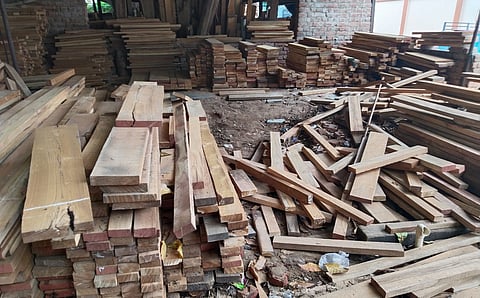

The National Green Tribunal (NGT) on May 27, 2025, directed the Union Ministry of Environment, Forest and Climate Change (MoEF&CC) to frame requisite guidelines for plywood industries and file an action taken report on the matter within six months before the Registrar General of the tribunal.
The MoEF&CC and Central Pollution Control Board (CPCB) have already framed guidelines regarding sand mining, stone crushers, brick kilns and common bio medical waste treatment plants, laying down measures for control of air and water pollution, the tribunal observed.
“Plywood industries having a pollution index of 78.3, falling in the orange category. They are acknowledged to cause air and water pollution, as reflected by the categorisation of the same by CPCB. But no guidelines have been issued regarding location, pollution control devices for prevention and control of air and water pollution as well as safeguards to be adopted in use of chemicals which have carcinogenic properties,” the court noted.
The court’s remarks came in response to a letter petition. Sumit Saini, a resident of Damla village in Haryana’s Yamunanagar district, sent the petition on May 14, 2022, to the NGT.
Around 25 plywood factories operate in Damla, while around 1,000 do so in the entire district, according to the application. Five brick kilns are also in operation. The applicant also attached pictures showing air pollution and black ash on the roof of every house in the village. The health of the villagers has mostly deteriorated, the petition claimed.
It added that there are no plants to control pollution in most of these factories. The amount of saltpetre has increased in the village’s drinking water.
According to the applicant, some factories dug borewells in the ground and poured dirty water into them. Due to this, the quality of underground water had deteriorated, the applicant said.
The NGT passed a number of directions pertaining to the Damla village case.
The tribunal directed the Haryana State Pollution Control Board (HSPCB) to review orders granting six plywood industries consent-to-operate.
The HSPCB is to do this by incorporating basic information regarding the industries, verifying their compliance status and imposing appropriate conditions to prevent and control pollution.
The court also directed the pollution control board (PCB) to inspect 15 plywood industries and confirm whether they have resin plants and manufacture the chemicals (Phenol Formaldehyde or Melamine Formaldehyde) for captive purposes or procure them from outside for manufacturing the final product.
In case any plywood industry had a resin plant and manufactured chemicals for captive purposes, their consent-to-operate was to be revoked and an order issued for closure of the resin plant.
The resin plant would remain closed till the concerned project proponent obtained environmental clearance in accordance with provisions of the EIA Notification 2006.
HSPCB must also carry out site inspection of the plywood units to confirm whether requisite safeguards regarding storage and use of chemicals like formaldehyde/glue have been adopted by the units. The PCB must take appropriate action on the basis of the inspection and file its report.
The NGT directed HSPCB to prepare and implement a standard operating procedure (SOP) and evolve a mechanism for verifying proper disposal of wood ash by the plywood industries in accordance with environmental norms/directions given by itself and the Supreme Court.
The PCB was asked to verify facts regarding disposal of wood ash by the plywood industries in low lying areas and compliance of conditions regarding its storage and transportation.
The Haryana body should verify the factual position regarding installation and adequacy of air pollution control equipment to prevent and control air pollution, including fugitive emissions, in all the 28 plywood industries and file its report in the matter within three months.
The information with relevant details regarding plywood industries in the state of Haryana must be uploaded on the HSPCB’s website with compliance status thereof.